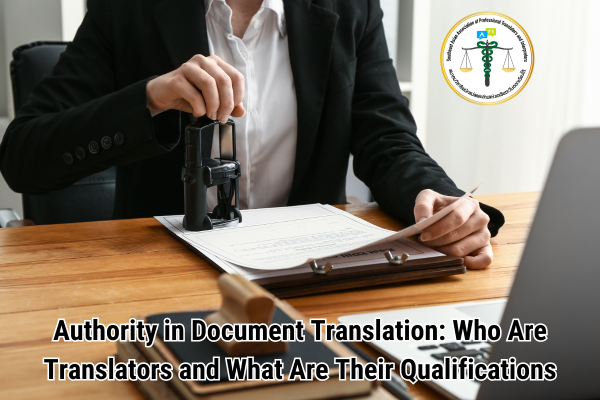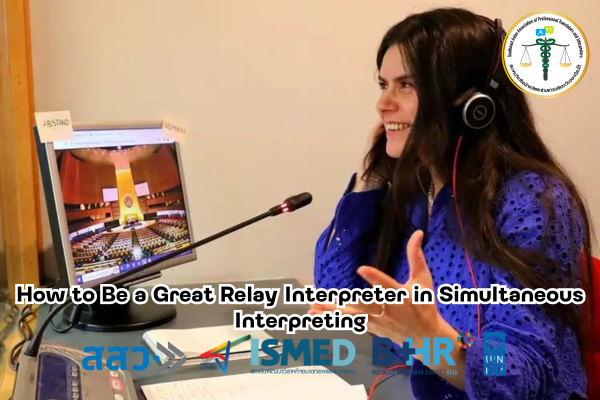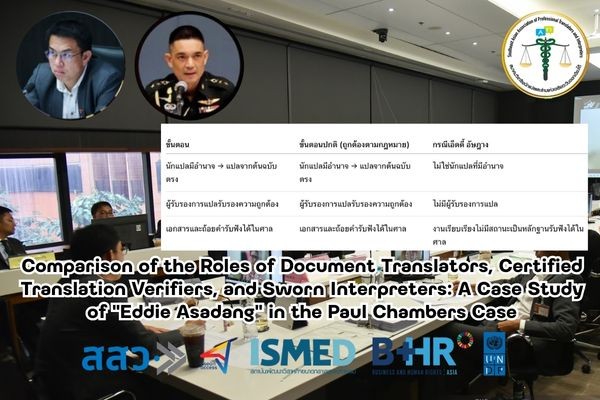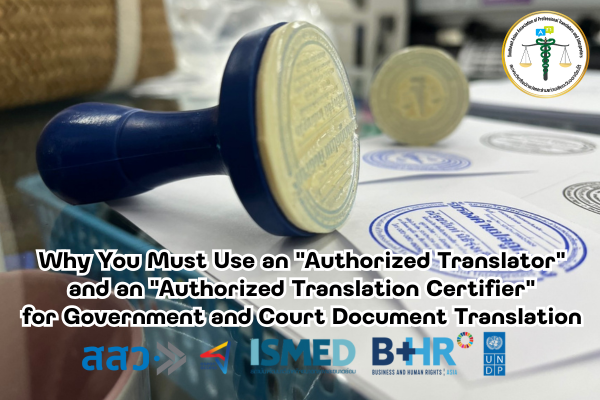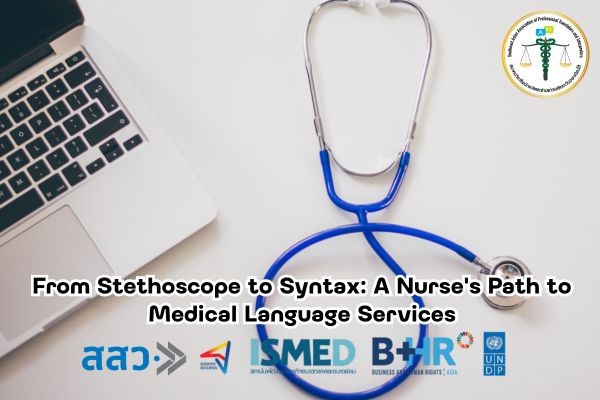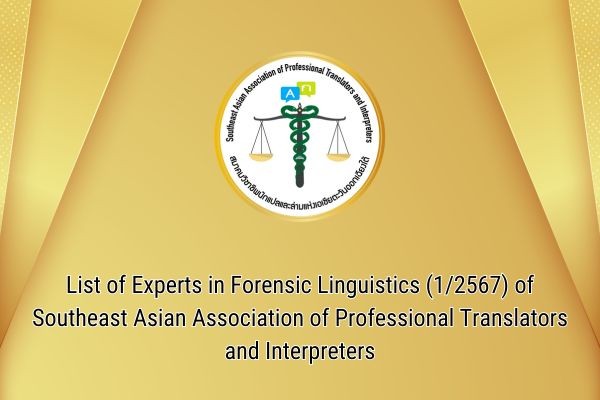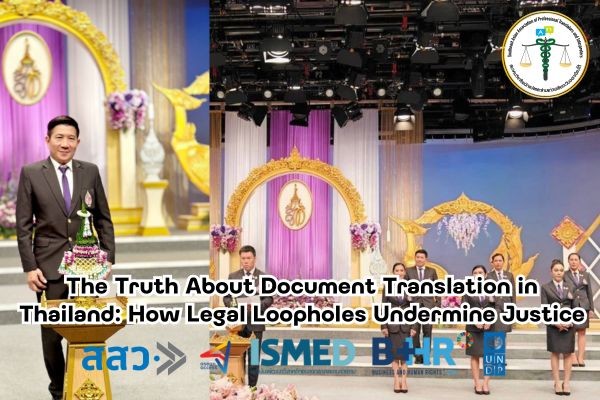Authority in Document Translation: Who Are Translators and What Are Their Qualifications?
27 January 2025, Bangkok – In Thailand, document translation plays a critical role in the judicial process, especially in significant cases where translated documents can serve as essential evidence in court. However, a common issue is the use of translators who lack authority or expertise, leading to disputes over translated documents. This article explores who qualified translators are, the necessary qualifications, and how to address issues when translated documents are contested in legal proceedings.
Who Are Authorized Translators?
Authorized translators are individuals who are certified or supervised by credible organizations or institutions. They can be categorized into two main groups:
1.1 Translators Certified by Professional Associations
The Southeast Asian Association of Professional Translators and Interpreters (SEAProTI) is an organization registered with the Department of Provincial Administration, Ministry of Interior, and announced in the Royal Gazette. Translators certified by SEAProTI must pass competency assessments and adhere to professional ethics, making them highly credible and authoritative.
1.2 Translators in Registered Translation Companies or Agencies
Translation companies or agencies registered with the Department of Business Development, Ministry of Commerce, must explicitly state their business objectives include providing translation services. Translators working for these entities often come from the pool of certified professionals mentioned in section 1.1. Therefore, companies or agencies registered correctly can be considered entities with authority in document translation.
Who Are Translators Without Authority?
Conversely, translators without authority are those who lack certification or supervision from professional associations or relevant organizations. This can lead to several problems:
-
Translation Errors: Texts or meanings in the documents may not accurately reflect the original.
-
Lack of Credibility: Translated documents may be rejected in court due to the translator’s unrecognized status.
Why Can Unauthorized Individuals Translate Documents in Thailand?
Currently, the Department of Consular Affairs, Ministry of Foreign Affairs of Thailand, broadly permits anyone to translate documents without specifying clear qualifications. Although officials review translations, this loophole allows unqualified individuals to engage in translation work, potentially compromising the overall quality of translated documents.
How Can Law Firms Provide Translation Services?
Law firms in Thailand typically do not translate documents directly but manage translation work in two primary ways:
-
Outsourcing Translation Work: Law firms often delegate translation tasks to qualified translators or specialized translation companies.
-
Company Registration: If a law firm’s business objectives include providing translation services and it is registered with the Department of Business Development, it gains legal authority to operate in this field.
How to Address Issues When Translated Documents Are Contested in Court
When translated documents are disputed in court, the following steps can be taken:
-
Verification and Certification: The documents can be reviewed and certified by an authorized translator.
-
Submission of Additional Documents: If errors are found, corrected translations can be submitted by a qualified translator.
-
Expert Testimony in Court: In some cases, lawyers may present translation experts as witnesses to support the validity of translated documents.
Recommendations for Improving the Document Translation System in Thailand
-
Setting Standards: Minimum qualifications for translators, such as training or certification by professional associations, should be established.
-
Enhancing the Role of Professional Associations: Organizations should prioritize using services from translators certified by professional associations.
-
Raising Public Awareness: Educate the general public on the importance of authorized and qualified translators.
Conclusion
Document translation in Thailand still faces challenges regarding the authority and expertise of translators. Establishing standards and promoting the use of services from certified translators can help reduce conflicts in the judicial process and sustainably improve the quality of document translation in the country.
SEAProTI’s certified translators, translation certification providers, and certified interpreters:
The Southeast Asian Association of Professional Translators and Interpreters (SEAProTI) has officially announced the criteria and qualifications for individuals to register as “Certified Translators,” “Translation Certification Providers,” and “Certified Interpreters” under the association’s regulations. These guidelines are detailed in Sections 9 and 10 of the Royal Thai Government Gazette, issued by the Secretariat of the Cabinet under the Office of the Prime Minister of the Kingdom of Thailand, dated July 25, 2024, Volume 141, Part 66 Ng, Page 100.
To read the full publication, visit: the Royal Thai Government Gazette
อำนาจในการแปลเอกสาร: ใครคือนักแปล และคุณสมบัติที่จำเป็น
27 มกราคม 2568, กรุงเทพมหานคร – ในประเทศไทย การแปลเอกสารเป็นกิจกรรมที่มีบทบาทสำคัญในกระบวนการยุติธรรม โดยเฉพาะในคดีสำคัญ ๆ ที่เอกสารแปลสามารถเป็นหลักฐานสำคัญในศาลได้ อย่างไรก็ตาม ปัญหาที่พบอยู่บ่อยครั้งคือการใช้นักแปลที่ไม่มีอำนาจหรือความเชี่ยวชาญในการแปล ซึ่งอาจนำไปสู่การคัดค้านเอกสารในชั้นศาล ในบทความนี้ เราจะมาวิเคราะห์ว่าใครคือนักแปลที่มีอำนาจ คุณสมบัติที่จำเป็นคืออะไร และวิธีการแก้ไขปัญหาเมื่อเอกสารแปลถูกคัดค้านในกระบวนการยุติธรรม
นักแปลที่มีอำนาจในการแปลคือใคร?
นักแปลที่มีอำนาจในการแปล หมายถึงผู้ที่ได้รับการรับรองหรืออยู่ภายใต้การกำกับดูแลขององค์กรหรือหน่วยงานที่มีความน่าเชื่อถือ โดยสามารถแบ่งออกเป็นสองกลุ่มหลักดังนี้:
1.1 นักแปลที่ได้รับการรับรองจากสมาคมวิชาชีพ (Certified or Qualified Translators)
สมาคมวิชาชีพนักแปลและล่ามแห่งเอเชียตะวันออกเฉียงใต้ (SEAProTI) เป็นองค์กรที่จดทะเบียนกับกรมการปกครอง กระทรวงมหาดไทย และมีการประกาศในราชกิจจานุเบกษา นักแปลที่ได้รับการรับรองจากสมาคมนี้จะต้องผ่านการประเมินความสามารถและปฏิบัติตามจรรยาบรรณวิชาชีพ จึงถือเป็นนักแปลที่มีอำนาจและความน่าเชื่อถือในระดับสูง หรือจะเป็นหน่วยงานอื่นก็ได้ที่มีอำนาจรับรองนักแปล ทั้งในไทยและในต่างประเทศ
1.2 นักแปลในบริษัทหรือร้านแปลที่จดทะเบียน (Translation Companies)
บริษัทหรือร้านแปลที่จดทะเบียนกับกรมพัฒนาธุรกิจการค้า กระทรวงพาณิชย์ จะต้องมีวัตถุประสงค์ทางธุรกิจที่ระบุถึงการให้บริการแปลเอกสาร นักแปลที่ทำงานในบริษัทเหล่านี้มักมาจากกลุ่มที่ได้รับการรับรองจากสมาคมวิชาชีพ (ข้อ 1.1) หรือมาจากการที่ร้านแปลรับสมัครมาเองโดยผ่านคุณสมบัติการรับรองผ่านกระบวนการสมัครงาน ดังนั้นบริษัทหรือร้านแปลที่มีการจดทะเบียนอย่างถูกต้องจึงถือได้ว่าเป็นหน่วยงานที่มีอำนาจในการแปลเอกสาร ดดยตราประทับจะเป็นไปในนามของร้านแปลหรือบริษัทแปลเอง และส่วนใหญ่จะไม่ใช่รายบุคคล
นักแปลที่ไม่มีอำนาจในการแปล
ในทางตรงกันข้าม นักแปลที่ไม่มีอำนาจมักเป็นผู้ที่ไม่ได้ผ่านการรับรองหรือไม่ได้รับการกำกับดูแลจากสมาคมวิชาชีพหรือหน่วยงานที่เกี่ยวข้อง แปลกันเองแบบฉุกเฉิน หรือนักแปลจำเป็น เพราะในบางพื้นที่ หานักแปลได้น้อยมาก อย่างไรก็ตาม ทางเลือกแบบนี้อาจมีประเด็นโต้แย้งในศาลเรื่องของอำนาจของนักแปล และคุณสมับติของนักแปล และอาจนำมาซึ่งปัญหาดังต่อไปนี้:
-
การแปลผิดพลาด: ข้อความหรือความหมายในเอกสารอาจไม่ถูกต้องตามต้นฉบับ ซึ่งหากไม่ได้ผ่านการอบรมหรือสอบประเมิน นักแปลประเภทนี้มีโอกาสที่จะแปลผิดได้มาก
-
ขาดความน่าเชื่อถือ: เอกสารแปลอาจถูกปฏิเสธในชั้นศาลเนื่องจากผู้แปลไม่มีสถานะที่ได้รับการยอมรับ โดยทนายที่เคร่งมาก ๆ อาจจะค้านได้ และการคัดค้านหรือโต้แย่งนักแปลและคุณสมบัตินักแปลเป็นสิ่งสำคัญต่อคดีความอย่างมาก
เหตุใดบุคคลที่ไม่มีอำนาจจึงสามารถแปลเอกสารได้ในประเทศไทย
ปัจจุบัน กรมการกงสุล กระทรวงการต่างประเทศของไทยกำหนดไว้อย่างกว้างขวางว่า ใครก็ตามสามารถแปลเอกสารได้โดยไม่ระบุคุณสมบัติที่ชัดเจน แม้ว่าจะมีเจ้าหน้าที่ตรวจสอบคำแปล แต่ช่องโหว่นี้ทำให้บุคคลที่ขาดความเชี่ยวชาญสามารถเข้าสู่กระบวนการแปลเอกสารได้ ซึ่งอาจส่งผลเสียต่อคุณภาพของเอกสารแปลในภาพรวม และทึกทักกันเอาเองว่า ทุกคนก็สามารถแปลเอกสารไปใช้ในงานได้ทุกงานเองได้
ส่วนหน่วยงานอื่น เช่น หน่วยงาน BOI หน่วยงานตำรวจตรวจคนเข้าเมือง องค์การอาหารและยา ฯลฯ และหน่วยงานอื่น ๆ ที่ยอมให้ใครแปลเอกสารมาก็ได้ หากเกิดความผิดพลาด หน่วยงานเหล่านี้ก็จะต้องเป็นผู้รับผิดชอบกับความผิดพลาดนั้น
และนอกจากนี้ หน่วยงานราชการเหล่านี้ ไม่ใช่หน่วยงานรับรองนักแปล และไม่มีอำนาจในการรับรองนักแปล เว้นเสียแต่ว่า จะได้มีการแก้ไขหรือเพิ่มเติมกฎกระทรวงใหม่
สำนักงานกฎหมายสามารถรับแปลเอกสารได้อย่างไร
สำนักงานกฎหมายในประเทศไทยมักไม่ได้แปลเอกสารโดยตรง แต่มีบทบาทในการบริหารจัดการงานแปลในสองรูปแบบหลัก:
-
การเอาท์ซอร์สงานแปล: สำนักงานกฎหมายมักส่งงานให้กับนักแปลที่มีคุณสมบัติหรือบริษัทแปลเอกสารที่เชี่ยวชาญช่วยแปลเอกสาร และรับรองการแปลมาด้วย เพราะหากเกิดความเสียหาย ก็ได้จะได้ให้นักแปลหรือร้านแปลเป็นผู้รับผิดชอบโดยตรง สำนักงานกฎหมายจะได้ไม่ต้องมาปวดหัวกับเรื่องที่ตัวเองไม่ได้เชี่ยวชาญ
-
การจดทะเบียนบริษัท: หากสำนักงานกฎหมายมีวัตถุประสงค์ทางธุรกิจที่ระบุถึงการให้บริการแปลเอกสาร และจดทะเบียนกับกรมพัฒนาธุรกิจการค้า ก็จะได้รับอำนาจตามกฎหมายในการดำเนินธุรกิจแปลเอกสาร เช่น สำนักงานกฎหมายที่ให้บริการงานด้านกฎหมายและคดีความ รวมถึงรับทำวีซ่าและใบอนุญาตให้ทำงาน
การแก้ปัญหาเมื่อเอกสารแปลถูกคัดค้านในศาล
เมื่อเอกสารแปลถูกคัดค้านในชั้นศาล มีวิธีการแก้ไขดังนี้:
-
การตรวจสอบและยืนยันคำแปล: สามารถส่งเอกสารให้กับนักแปลที่ได้รับการรับรองเพื่อตรวจสอบและยืนยันความถูกต้อง
-
การยื่นเอกสารเพิ่มเติม: หากพบข้อผิดพลาด สามารถแก้ไขและยื่นเอกสารที่แปลใหม่โดยนักแปลที่มีอำนาจ
-
การใช้ผู้เชี่ยวชาญในศาล: ในบางกรณี ทนายความอาจนำผู้เชี่ยวชาญด้านการแปลมาเป็นพยานเพื่อสนับสนุนเอกสารแปล
ข้อเสนอแนะเพื่อปรับปรุงระบบการแปลเอกสารในประเทศไทย
-
การกำหนดมาตรฐาน: ควรมีการกำหนดคุณสมบัติขั้นต่ำสำหรับผู้แปลเอกสาร เช่น การผ่านการอบรมหรือการรับรองจากสมาคมวิชาชีพ
-
การเพิ่มบทบาทสมาคมวิชาชีพ: หน่วยงานต่าง ๆ ควรให้ความสำคัญกับการใช้บริการนักแปลที่ได้รับการรับรองจากสมาคมวิชาชีพ
-
การสร้างความตระหนักรู้: สร้างความเข้าใจในเรื่องอำนาจและความเชี่ยวชาญของนักแปลให้กับประชาชนทั่วไป
สรุป
การแปลเอกสารในประเทศไทยยังคงมีปัญหาในเรื่องของอำนาจกระทำการและความเชี่ยวชาญของผู้แปล และหน่วยงานราชการหลายแหล่งที่ไม่มีอำนาจรับรองนักแปลก็พยามเข้ามามีบทบาท ซึ่งไม่ใช่หน้าที่ แม้จะอ้างว่าไม่มีกฎหมายกำกับเรื่องคุณสมบัตินักแปลก็ตาม การกำหนดมาตรฐานและการส่งเสริมการใช้บริการจากนักแปลที่ได้รับการรับรองสามารถช่วยลดข้อขัดแย้งในกระบวนการยุติธรรมและยกระดับคุณภาพของการแปลเอกสารในประเทศได้อย่างยั่งยืน
เกี่ยวกับนักแปลรับรอง ผู้รับรองการแปล และล่ามรับรองของสมาคมวิชาชีพนักแปลและล่ามแห่งเอเชียตะวันออกเฉียงใต้
สมาคมวิชาชีพนักแปลและล่ามแห่งเอเชียตะวันออกเฉียงใต้ (SEAProTI) ได้ประกาศหลักเกณฑ์และคุณสมบัติผู้ที่ขึ้นทะเบียนเป็น “นักแปลรับรอง (Certified Translators) และผู้รับรองการแปล (Translation Certification Providers) และล่ามรับรอง (Certified Interpreters)” ของสมาคม หมวดที่ 9 และหมวดที่ 10 ในราชกิจจานุเบกษา ของสำนักเลขาธิการคณะรัฐมนตรี ในสำนักนายกรัฐมนตรี แห่งราชอาณาจักรไทย ลงวันที่ 25 ก.ค. 2567 เล่มที่ 141 ตอนที่ 66 ง หน้า 100 อ่านฉบับเต็มได้ที่: นักแปลรับรอง ผู้รับรองการแปล และล่ามรับรอง


